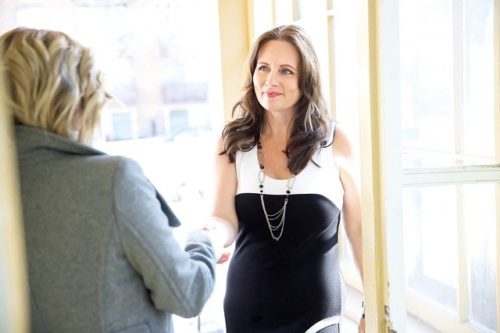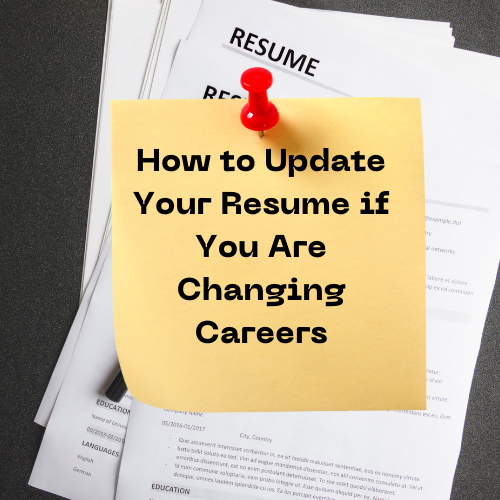Looking for a career change this year? You aren’t alone! In fact, a recent poll published by Fast Company says 52% of US workers are considering a job change. What has motivated people is a change in priorities, a desire for a better work-life balance, and a strong need to work from home, among other reasons. Unfortunately, changing careers isn’t easy, especially if you don’t have the obvious transferrable skills. So, I reached out to the experts to get advice on how to update your resume for a career change.
Focus on soft skills and accomplishments.
Public relations professional, Jen-Ai Notman, has hired many people that are making a career change. She recommends highlighting the soft skills on your resume. If you are transitioning from sales to marketing, for example, “focus on your strong communication ability and conscientiousness by putting those at the top of your position details,” Notman says.
Chloe Sisson, Outreach Coordinator at PR agency Zen Media, suggests when changing careers, “hone in on the skills you’ve acquired that will help you succeed in that field.” While soft skills are still very important, Sisson recommends that “when describing duties and accomplishments at your past job, include specific numbers and percentages that you were able to achieve.”
Most of all, it’s important to convey the added value you will be bringing to the company. Miranda Yan, Founder at VinPit, says, “It might be possible that you don’t have an impressive achievement list or remarkable experience relevant to the new job position. However, you can still establish yourself as a strong contender by letting the employer know how you will add value to the company. For this, describe the specific skills that you’d be leveraging to make valuable contributions.”
Be excited to learn.

When updating your resume for a career change, it’s important to showcase your desire to learn. Notman says, “Employers are looking for people that are passionate about the company’s mission and eager to roll their sleeves up to learn and be a part of the team.”
One way of proving your desire to learn is through informational interviews. Tash Benjamin of TKing Enterprises recommends using your resume to get informational interviews with decision-makers in your desired career field. By doing so, you are not only learning more about your field but also developing connections in your new industry. “It’s important to learn about your new industry from insiders so that you can learn the lingo of your new field and gain tips about which of your attributes and experiences will be attractive to hiring managers,” Benjamin says.
Mention the reason for the career change.
Remember, when applying to jobs, it may not be clear why you are changing careers. So mention the reason for your career change in the summary section of your resume. Notman suggests by including “a sentence about why you are so passionate to apply your current skillset of XX into your passion for XX.”
Benjamin also suggests you add an objective at the top of your resume. “The objective should focus on the skills and attributes that you currently have and what facets you’re looking for in your new position.” This way you can address the doubters who fear you may be applying to jobs without putting much thought into your job application.
Use a combination resume format.
Using the combination format was the best way to format your resume when changing careers. A combination format uses a blend of two standard resume formats: chronological and functional. A chronological resume lists your work history, starting with your most recent position and then going back from there. A functional resume focuses on professional skills and what you can do, instead of what you did and for whom. Finally, a combination resume utilizes both aspects of chronological and functional. According to the experts at Change My Life Coaching, a combination resume is perfect if you want to transfer to a new industry.
Deepak Shukla, the founder of Pearl Lemon, recommends this resume formatting style as well. “It does a great job of showcasing your talents for people going through a career change or any employment gaps.”
Use appropriate keywords from the job ad.
According to Christopher Lawrence, Founder of Change My Life Coaching, ” Applicant Tracking Systems are here to stay.” In a recent article about why your resume might not be getting noticed, one great tip they’ve shared is inserting keywords from the job ad to beat the ATS system. He recommends using TagCloud to grab the keywords from the job ad and inserting them into your resume. However, don’t go overboard. A recruiter will notice immediately, and “they’ll be able to see through your strategy,” Lawrence says.
Be sure to also match the language in the job description. Linda Greenfield, Career Counselor at Essential Career Counseling suggests, “If you are transitioning out of Healthcare to Professional Services, use either “Client” or Customer” (whichever is in the job description) instead of ‘patient.'”
Take on a side hustle.

Personally speaking, my own side hustle helped prepare me for my career change. Taking on a side hustle will allow you to gain experience in your preferred field. Greenfield recommends taking a volunteer job or do contract work to get a little experience in the field you are pursuing. Virtual volunteer website, Catch a Fire, is a great way to find virtual volunteer opportunities to build your skills, which will show your future employer, how eager you are to learn.
Rebecca Churchill, President at Churchill Communications, found her own career path that way as well. She states, “It’s smart to start by volunteering in an area of interest and to get some mentoring as well as a professional development class or two,” Churchill says. “Most people can’t afford to just quit when you wish but starting with a side hustle that becomes the next career is how I made it happen. Everyone on my team has a side hustle; part interest, part passion.”
Job searching isn’t easy. However, you want to give yourself the best chance for an interview. So, updating your resume for changing careers is an important part of the process.
